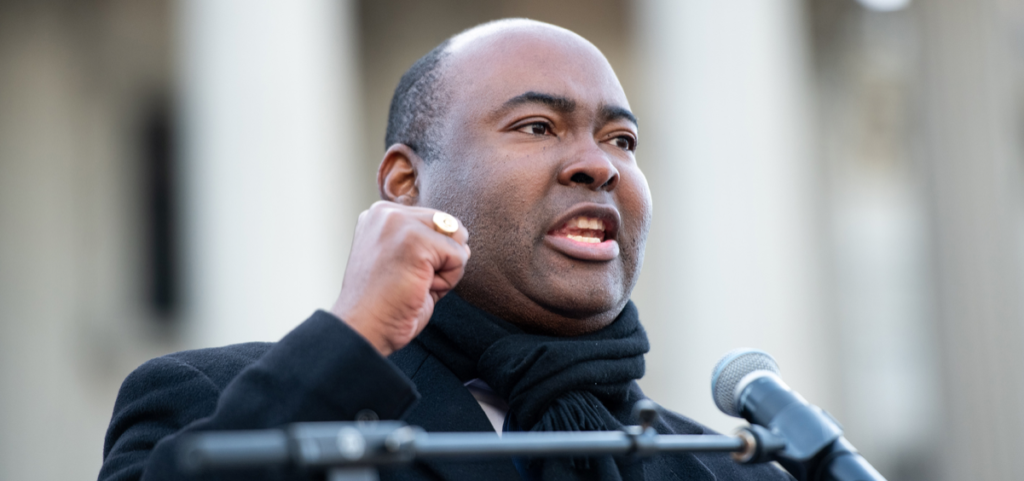Battle of the Bills: Palmetto State Senate Contest Thrust Into National Spotlight as Democratic Challenger Outraises Lindsay Graham

Image Courtesy of Marketplace.org
By Justin Lamoureux
In many ways, Democrat Jaime Harrison could easily be mistaken for a U.S. Senator: His cool demeanor, bold dialogue and straightforward way of thinking undoubtedly align with anyone’s image of Capitol Hill behavior. In a recent interview with CNN’s Chris Cuomo, the senate candidate outlined his vision of a “new south” that is more “bold [and] diverse” than ever before, while simultaneously lambasting his opponent, Republican incumbent Lindsay Graham, for Graham’s behavior during the controversial hearings to confirm Judge Amy Coney Barrett to the U.S. Supreme Court ahead of the November election. Given that he is challenging a three-term GOP incumbent in heavily Republican South Carolina, one might dismiss Harrison as being a “long shot” candidate, or easily reach the conclusion that he cannot win.
Or can he?
Conventional wisdom may paint a gloomy picture with regard to Harrison’s electoral prospects, but few would argue that he is pulling ahead in the fundraising battle: During the third quarter of this year, the Democratic candidate amassed a record-shattering $57.9 million. This equates to Harrison outraising Graham by $29.4 million (nearly 2-to-1), and decisively surpasses the previous record of $38.1 million set by Beto O’Rourke in 2018. That year, O’Rourke challenged U.S. Senator Ted Cruz (R – TX), and stunned the political world by coming within three points of victory in the Lone Star State.
Harrison’s unprecedented cash haul solidifies his status as the most successful Democratic fundraiser in this election cycle. Among the party’s candidates for U.S. Senate, nobody else comes close; Sara Gideon, who is challenging longtime Maine incumbent Susan Collins, raised $39.4 million during the third quarter. In Arizona, Mark Kelly, who hopes to unseat the more recently appointed Martha McSally, followed closely behind at $38.8 million.
In this (highly unorthodox) election year, the U.S. Senate race in South Carolina enjoys a place of prominence as the most expensive nationwide; collectively, Harrison and Graham have raised over $144 million. Unsurprisingly, the second-highest price tag yielded by a senate race also features a highly polarizing incumbent: In Kentucky, Mitch McConnell is facing off against Amy McGrath, a Democratic challenger who poses little threat in the polls, but nevertheless gives him a run for his money (literally). Together, McConnell and McGrath brought in $135 million over the last quarter.
Ultimately, though, money does not win elections. As the statistics show, the odds remain solidly against Harrison; FiveThirtyEight gives the Democrat a mere 22% chance of ousting Lindsay Graham.
In recent weeks, the website has developed this probability based on a multitude of polls taken among likely voters in South Carolina: A Data Progress poll showed Harrison narrowly leading Graham 47 – 46. While this certainly provides the Democrats with grounds for optimism, it should be noted that said poll received only a “B -” rating from FiveThirtyeight, implying a marginal degree of accuracy. A Siena College/New York Times poll conducted around the same time – which enjoyed an “A +” rating – showed Harrison trailing Graham 46 – 40.
Both polls accounted for undecided voters – a significant number of which appear to remain in the cards. But given the supposed credibility of each, and the traditional political leanings of the state, the assumption could be made that from a numerical standpoint, the ball remains in Lindsay Graham’s court.
Granted, not all polls look promising for Graham; in fact, some even imply the senator is underperforming with his own base. A recent CBS News/New Gov poll showed Graham with 76% support among South Carolina conservatives, compared to 88% for President Trump. Not to mention, Graham’s overall net approval rating stands at -8%
Harrison’s performance may be unusually successful for a Democrat in his respective state, but his level of statistical support is hardly anomalous. Barack Obama received 44% of the vote in South Carolina in both 2008 and 2012. In 2018, the Democratic gubernatorial candidate in South Carolina earned 46% of the vote.
Still, there are underlying factors that can work to his favor. These potential advantages correlate primarily with demographics: South Carolina has one of the largest percentages of African-American voters (28%), and college-educated white voters (27%) in the country. The former has long proven critical to Democrats’ electoral success down the ballot, while the latter have deserted the GOP in historically large numbers since Trump took office. What’s more, in 2018 Democrat Joe Cunningham made significant inroads by flipping a Charleston-area congressional district that had not broken for his party in four decades.
So, what should the average voter take away from all this? For starters, specific amounts of cash and – to some extent – strong polling averages do not guarantee a victory for Harrison. Keep in mind that he is a Democrat who is attempting to win statewide in South Carolina, something that has not been done since 1976 (at least, not during a presidential year). It also does not work to his favor that Senator Graham has the inherent advantage of an incumbent, flanked by the president and virtually the entire Republican establishment.
But don’t write him off just yet. For a supposedly “long shot” challenger, Jaime Harrison has maintained a steady performance throughout his campaign. Again, his monetary advantage is highly unlikely to be replicated on Election Night, but it certainly plays an important role in keeping him within striking distance of victory.
At this point, it should be implicit that everything relayed by the polls must be taken with a grain of salt. If the last four years have taught the political world anything, it’s that only the most unrealistic possibilities can be ruled out. With that in mind, the battle ensuing between Graham and Harrison may not be a pure coin toss, but it most certainly is one to watch.







